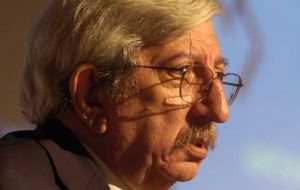MercoPress. South Atlantic News Agency
OAS supports Bolivia unity in eve of crucial autonomy vote
 OAS Ambassador Dante Caputo
OAS Ambassador Dante Caputo Following long discussions until early Saturday morning, the Organization of American States, OAS, supported the territorial integrity of Bolivia but abstained from condemning the autonomy referendum which is scheduled for Sunday in the province of Santa Cruz, the country's richest.
The referendum has been described by the Bolivian administration of President Evo Morales as a threat to the country's stability which could lead to violence according to Bolivia's Foreign Affairs minister David Choquehuanca and the OAS Political Affairs secretary Dante Caputto who has been trying to mediate between the central government and the dissident province. Although Bolivian officials considered the OAS resolution a diplomatic success it did not go as far as including a plain blank rejection of the referendum as was expected by Mr. Choquehuanca. "It's important for our constitutionality, for the integrity and stability of Bolivia, said Choquehuanca at a press conference following the OAS resolution. "It includes most of Bolivia's requests and stands up for the unity of the country", he added. The essence of the OAS resolution expresses solidarity and support for the people of Bolivia, the Constitutional Government of President Evo Morales, the democratic institutional system, and officials elected by the Bolivian people, and underlines the "expressions of respect for the constitutional order and the territorial integrity of the Republic of Bolivia, and to reject any attempt to disrupt them". It appeals to "all political, social, and regional players of Bolivia that have expressed interest in and readiness to engage in dialogue and consensus-building to ensure that such efforts take concrete form as soon as possible". Makes a vigorous appeal to "all actors to ensure that their all actions are governed by respect for the rule of law, refraining from any action that may lead to a breakdown of the peace and/or constitutional order and affect coexistence among Bolivians" and finally calls upon all political actors to work together "with full respect for the democratic process, and to resolve their political differences through peaceful means". In his report OAS political affairs secretary Caputto said he feared "violence could become the main issue in Bolivia politics". For President Morales administration the Santa Cruz autonomy referendum is "absolutely illegal and unconstitutional" and the blocking attitude to any form of dialogue by Santa Cruz officials "can only lead to violence". Choquehuanca warned that if the Santa Cruz autonomy referendum is accepted, any region, province of municipality of any OAS country member could fall in the same trap of a pseudo constitutional autonomy statute. "We're not against autonomies, but rather support constitutional, legal autonomies that strengthen the country's unity. In Bolivia there's an attempt to use a legitimate and democratic instrument as voting for an anti democratic, anti constitutional objective". If the Santa Cruz initiative becomes effective three more Bolivian provinces are ready to follow with similar autonomy referendums next June. Santa Cruz is not only a political blow for President Morales the first indigenous elected leader of the country but also for the economy. The dissident province is the richest and holds most of the country's largest gas and oil reserves. According to political analysts in La Paz, the Bolivian Army would not tolerate the dismembering of the country's unity.




Top Comments
Disclaimer & comment rulesCommenting for this story is now closed.
If you have a Facebook account, become a fan and comment on our Facebook Page!